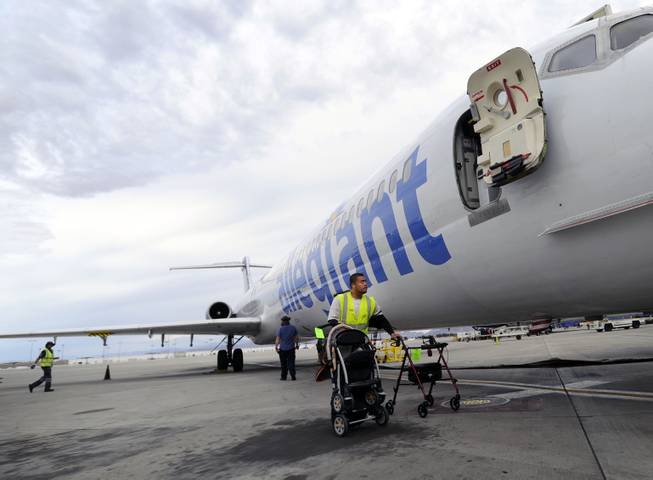
David Becker / AP
In this Thursday, May 9, 2013, photo, ramp agent Vince Divon retrieves gate checked items after the Allegiant Air jet parked at McCarran International Airport in Las Vegas.
Friday, Dec. 18, 2015 | 6:23 p.m.
The Federal Aviation Administration has scolded Allegiant Air for an emergency landing at a closed airport in Fargo, N.D., in a ruling that appears to contradict the airline's statements about the flight.
The FAA issued a reprimand called a "letter of correction" to the Las Vegas-based airline saying the July 23 flight from Las Vegas to Fargo "did not appear to have adequate fuel" for such a trip, according to information released this week.
The agency also indicated that airline personnel may have failed to properly recognize air space restrictions that applied to Fargo's Hector International Airport when the aircraft landed.
All this stands in contrast to Allegiant's previous statements to reporters indicating the flight had more than adequate fuel and concluded, "Our captain exercised sound judgment in the operation of his aircraft."
The FAA reprimand is a mild one and falls short of the sort of enforcement action in which fines can be assessed. The FAA required Allegiant to revise its procedures and training "to help prevent this type of incident from occurring again." The agency noted that Allegiant had already instituted "improvements" in procedure to ensure personnel recognize airport restrictions for any flight's destination.
An Allegiant spokeswoman said they had received the FAA's letter of correction and implemented new procedures and training. The airline offered no additional comment.
Allegiant's financial well-being is critically important to St. Pete-Clearwater International Airport. About 95 percent of the record 1.6 million passengers expected to use the airport by year's end fly on Allegiant.
The Tampa Bay Times first reported in July that the pilot of Flight 426 notified the Fargo airport tower that he was critically low of fuel and needed to land immediately. The tower informed the flight that the airport was closed, telling the pilot, "Your company should have been aware of this for a number of months."
Flight restrictions applied at the airport because the Navy's flight demonstration squadron, the Blue Angels, was practicing for an upcoming air show.
The landing was one of a series of embarrassing emergency landings for Allegiant during the summer, including three at the Pinellas County airport.
The Allegiant pilot on the Fargo flight told air traffic control, "We don't have enough fuel to go anywhere else. And our guys are trying to get in touch with the tower manager right now to coordinate our landing or I'm going to have to declare an emergency and come in and land."
The tower told the flight he could land in about 20 minutes. The pilot responded, "Yeah, I don't have 20 minutes."
The tower then recommended landing at another airport 70 miles to the north.
"Yeah, listen, we're bingo fuel here in about probably three to four minutes and I got to come in and land," said the pilot. "Bingo fuel" is a military term indicating a flight is critically low of fuel.
The flight did ultimately safely land at Fargo after declaring an emergency. Allegiant later said the aircraft had enough fuel to fly nearly an additional 42 minutes, which it said met FAA requirements and was a safe margin of fuel.
What made the flight especially noteworthy was that it was being flown by two pilots who are in Allegiant management — the airline's vice president of flight operations and its director of flight safety. The aircraft carried 144 passengers and six crew members.
The low-cost carrier told reporters afterward both the airline and the FAA found that the pilots acted "in a safe manner and within the bounds of all regulations."
Allegiant's pilots' union, involved in protracted and bitter contract negotiations with the airline, was quick to pounce on the FAA admonishment.
"Pilots have been raising concerns about how Allegiant's bare minimum approach has led to a high rate of emergency landings and diversions, and nowhere is this more apparent than the incident in Fargo," Daniel Wells, president of Teamsters Local 1224, which represents the pilots, said in a written statement.
But Wells said the pilots of Flight 426 "chose to put their passengers in a dangerous situation that was entirely avoidable. It's encouraging to see the FAA confirm exactly what pilots have been saying."

Join the Discussion:
Check this out for a full explanation of our conversion to the LiveFyre commenting system and instructions on how to sign up for an account.
Full comments policy